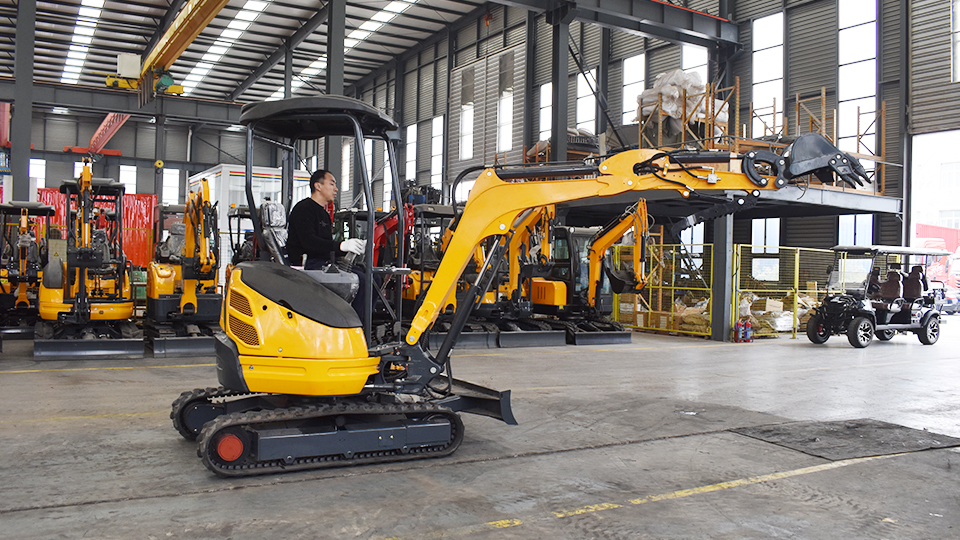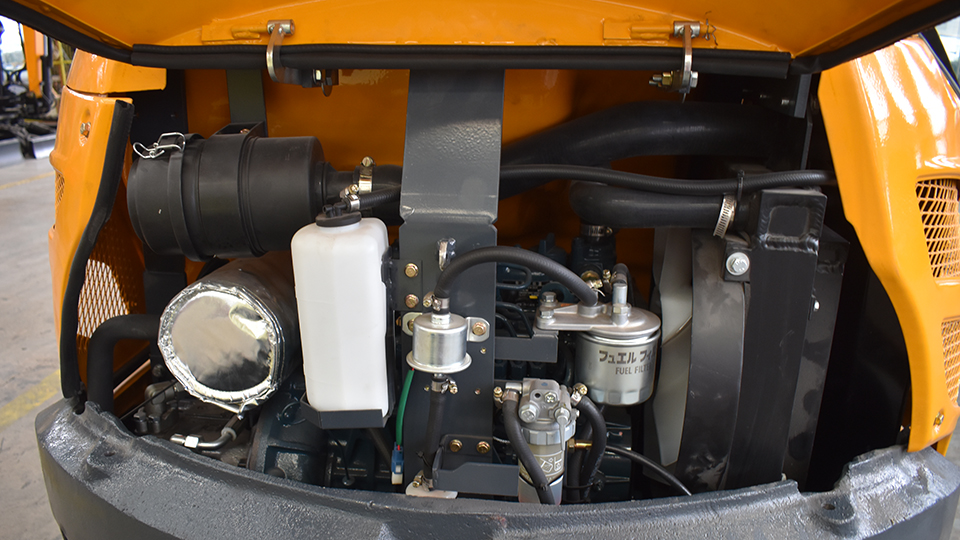The Benefits of Renting vs. Buying an Excavator: A Comprehensive Technical and Financial Analysis
Excavators are indispensable heavy machines in the construction, mining, agriculture, and landscaping industries. Their ability to dig, trench, demolish, and lift makes them central to a vast array of projects. However, acquiring an excavator represents a significant capital expenditure, leading many businesses and contractors to a critical decision point: should they rent or buy? This technical article will provide a comprehensive analysis of the benefits associated with both renting and buying an excavator, delving into the financial, operational, and strategic implications of each approach, helping decision-makers make an informed choice tailored to their specific business needs.
Understanding the Financial Landscape
The decision to rent or buy an excavator is fundamentally a financial one, impacting cash flow, balance sheets, and long-term profitability.
The Costs of Buying an Excavator:
Purchasing an excavator involves more than just the sticker price. A true cost analysis must consider:
Upfront Capital Expenditure: This is the immediate, substantial outlay of cash. A new mid-sized excavator (e.g., 20-ton class) can range from $150,000 to $300,000 or more, depending on specifications, attachments, and manufacturer. Mini excavators are less, but still represent a significant investment. This ties up working capital that could be used for other business growth initiatives.
Financing Costs: Unless purchased outright, interest payments on loans or lease agreements add significantly to the overall cost. Longer loan terms reduce monthly payments but increase total interest paid.
Depreciation: Heavy equipment depreciates rapidly, especially in the first few years. While depreciation can offer tax benefits, it represents a real loss in asset value over time.
Technical Note: Depreciation schedules (e.g., MACRS for U.S. taxes) can vary, impacting the net cost of ownership. Calculating the Total Cost of Ownership (TCO) requires factoring in this loss of value.
Maintenance and Repairs: Excavators are complex machines requiring regular preventive maintenance (oil changes, filter replacements, hydraulic system checks) and occasional major repairs (engine overhauls, hydraulic pump replacements, undercarriage work). These costs escalate with machine age and usage.
Technical Note: Predictive maintenance technologies and telematics can help manage these costs by identifying potential issues early, but still require investment.
Insurance: Comprehensive insurance coverage is necessary to protect against damage, theft, and liability. Premiums can be substantial.
Storage: Secure storage facilities are required when the excavator is not in use, adding to overheads.
Transportation: Owning means being responsible for transporting the excavator to and from job sites, requiring a suitable truck and trailer, and potentially specialized permits.
Taxes and Licensing: Property taxes on the asset and annual licensing fees add to the recurring costs.

Resale Value and Disposition: When the time comes to upgrade or dispose of the machine, finding a buyer and negotiating a fair price can be time-consuming and challenging.
The Costs of Renting an Excavator:
Renting involves a more straightforward cost structure, primarily consisting of:
Rental Fees: These are typically daily, weekly, or monthly rates. Rates vary based on excavator size, type, attachments, and the rental period.
Transportation Fees: The rental company often charges for delivery to and pick-up from the job site.
Fuel: The renter is responsible for fueling the machine during the rental period.
Operator Costs: The renter must provide a qualified operator.
Damage Waiver/Insurance: Rental companies offer damage waivers, which can be an additional cost but limit the renter's liability for certain types of damage. Alternatively, the renter's existing insurance may cover rented equipment.
Overtime/Excess Hours: Some rental agreements have limits on operating hours per day/week, with extra charges for exceeding them.
Benefits of Renting an Excavator
Renting offers a compelling set of advantages, particularly for businesses with fluctuating project demands or those seeking to optimize cash flow.
Reduced Upfront Capital Outlay: This is arguably the most significant benefit. Renting eliminates the need for a substantial down payment or large loan, preserving working capital for other critical business investments (e.g., labor, materials, marketing).
Financial Implication: Improves liquidity and cash flow management, which is vital for small and medium-sized enterprises (SMEs).
Access to a Wider Range of Equipment: Rental fleets typically offer a diverse selection of excavator sizes, models, and specialized attachments (e.g., hydraulic hammers, augers, grapples, mulchers). This allows businesses to choose the exact machine best suited for a specific task, optimizing efficiency and performance.
Technical Implication: Using the right-sized machine for the job minimizes fuel consumption, reduces wear and tear, and enhances productivity. For instance, a mini-excavator is ideal for tight urban spaces, while a larger track hoe is necessary for mass excavation.
Elimination of Maintenance and Repair Costs: The rental company is responsible for all routine maintenance, unexpected repairs, and parts replacement. This offloads a significant financial and operational burden from the renter.
Technical Implication: Rental equipment is typically well-maintained to ensure reliability, reducing the risk of costly downtime on a project. Rental companies often employ certified technicians and use genuine OEM parts.
No Depreciation Concerns: Renters do not bear the financial loss associated with equipment depreciation.
Financial Implication: This protects the balance sheet from asset devaluation.
Flexibility and Adaptability: Renting provides unparalleled flexibility. Businesses can rent for the exact duration of a project (daily, weekly, monthly) and return the equipment when no longer needed. This is ideal for project-based work, seasonal demands, or when testing new markets.
Strategic Implication: Allows businesses to scale their equipment fleet up or down quickly in response to market demand, without the long-term commitment of ownership.
Access to Latest Technology: Rental companies frequently update their fleets, providing access to newer models equipped with advanced features, improved fuel efficiency, telematics, and enhanced safety systems without the capital cost of purchasing new.
Technical Implication: Newer machines often incorporate Tier 4 Final or higher emissions standards, which is crucial for compliance in certain regions or projects. They may also have better operator ergonomics and advanced machine control systems.
Reduced Storage and Transportation Headaches: Rental companies handle secure storage when the equipment is not in use. They also typically manage transportation to and from the job site, often including specialized hauling equipment.
Operational Implication: Frees up yard space and eliminates the need for the renter to invest in specialized transport vehicles and drivers.
Predictable Costs: Rental rates are typically fixed for the agreed-upon period, allowing for easier budgeting and cost forecasting for specific projects.
Financial Implication: Reduces financial uncertainty associated with unexpected maintenance or repair costs.
Tax Advantages: Rental payments are often fully tax-deductible as an operating expense, potentially offering a more favorable tax treatment than depreciation on an owned asset. (Consult a tax professional for specific advice).
Trial Before Purchase: Renting can serve as an extended test drive. Businesses can rent a specific model or brand to evaluate its performance and suitability for their operations before committing to a purchase.
Benefits of Buying an Excavator
Despite the compelling case for renting, owning an excavator also presents significant advantages, especially for businesses with consistent, high-volume demand for such equipment.
Long-Term Cost Savings (for high utilization): If an excavator is used frequently and consistently (e.g., 70-80% utilization rate or higher), the total cost of ownership over its lifespan can be lower than continuous long-term rental fees.
Financial Implication: The break-even point between renting and buying is typically calculated based on annual hours of operation, often ranging from 600-800 hours per year.
Equity and Asset Building: The excavator becomes a tangible asset on the balance sheet, contributing to the company's net worth.
Financial Implication: Provides collateral for future loans and can be seen as a long-term investment.
Unlimited Availability: The excavator is always on hand and available whenever needed, without the need to coordinate with a rental company or worry about availability. This is crucial for urgent or unscheduled work.
Operational Implication: Maximizes scheduling flexibility and reduces potential project delays due to equipment unavailability.
Customization and Specialization: Owners can customize their excavator with specific attachments, modifications, or technology integrations (e.g., 3D GPS machine control systems, specialized hydraulic circuits) that are tailored to their unique operational needs.

Technical Implication: Optimizes performance for niche applications and improves operator efficiency with familiar, consistent setup.
Operator Familiarity and Efficiency: Operators become intimately familiar with their own machine's quirks, controls, and capabilities, leading to higher efficiency, faster work, and potentially reduced wear and tear due to consistent operation.
Operational Implication: Reduces training time and enhances operator comfort and confidence.
Brand Consistency and Reputation: Owning a fleet of specific brands or models can contribute to a consistent company image and operational standards.
Tax Benefits: As mentioned, depreciation can offer significant tax deductions, reducing taxable income. Interest paid on equipment loans may also be deductible. (Consult a tax professional).
Revenue Generation: The owned excavator can potentially be rented out to other contractors during periods of low utilization, generating additional revenue.
Sense of Control and Pride of Ownership: For many business owners, owning their equipment provides a greater sense of control over their operations and a source of pride.
Decision-Making Framework: Rent vs. Buy
The optimal choice between renting and buying is not universal; it depends on a confluence of factors unique to each business. A structured decision-making process is essential:
Utilization Rate Analysis: This is the most critical factor.
High Utilization (e.g., >700-800 hours/year): Favors buying. The fixed costs of ownership are amortized over more operating hours, making the per-hour cost lower than renting.
Low to Moderate Utilization (e.g., <600-700 hours/year): Favors renting. The cost of idle time (storage, depreciation, interest) for an owned machine quickly outweighs rental costs.
Projected Workload and Consistency:
Consistent, Long-Term Work: Favors buying.
Sporadic, Project-Based, or Seasonal Work: Favors renting.
Capital Availability and Cash Flow:
Limited Capital/Prioritizing Cash Flow: Favors renting.
Ample Capital/Strong Balance Sheet: Buying becomes a more viable option.
Maintenance Capabilities:
In-house maintenance team/facilities: Supports buying.
No in-house maintenance/reliance on third parties: Favors renting, as maintenance is included.
Technological Obsolescence:
Need for latest tech/emission compliance: Renting offers easier access to newer models.
Long-term use of current tech: Buying is fine.
Tax Strategy: Consult with a financial advisor or tax professional to understand the depreciation benefits of ownership versus the expense write-offs of renting for your specific business structure.
Emergency/Backup Needs: Consider the availability of rental options for backup in case your owned machine breaks down.
Hybrid Approaches
It's also important to note that many businesses adopt a hybrid strategy:
Own Core Fleet, Rent Specialized/Supplemental Equipment: A company might own a few commonly used excavators for daily work and rent larger or specialized excavators (e.g., an excavator with a specialized long-reach boom) for specific projects that don't justify a purchase.
Rent-to-Own Programs: Some rental companies offer programs where a portion of the rental payments can be applied towards the purchase price if the renter decides to buy the machine. This allows for a trial period and potential equity building.
Conclusion
The decision to rent or buy an excavator is not one-size-fits-all. It requires a meticulous evaluation of a business's operational profile, financial health, project pipeline, and long-term strategic goals. Renting offers unparalleled flexibility, preserves capital, and eliminates the burden of maintenance and depreciation, making it ideal for businesses with fluctuating demands or those prioritizing liquidity. Conversely, buying provides long-term cost savings for high-utilization scenarios, builds equity, and offers complete control over the asset, suiting businesses with consistent, heavy workload. By thoroughly analyzing the technical implications and financial benefits of each option, businesses can make an informed choice that optimizes their equipment acquisition strategy, ensuring efficiency, profitability, and sustained success in the competitive construction and heavy equipment landscape.
Post time:Sep-25-2020
